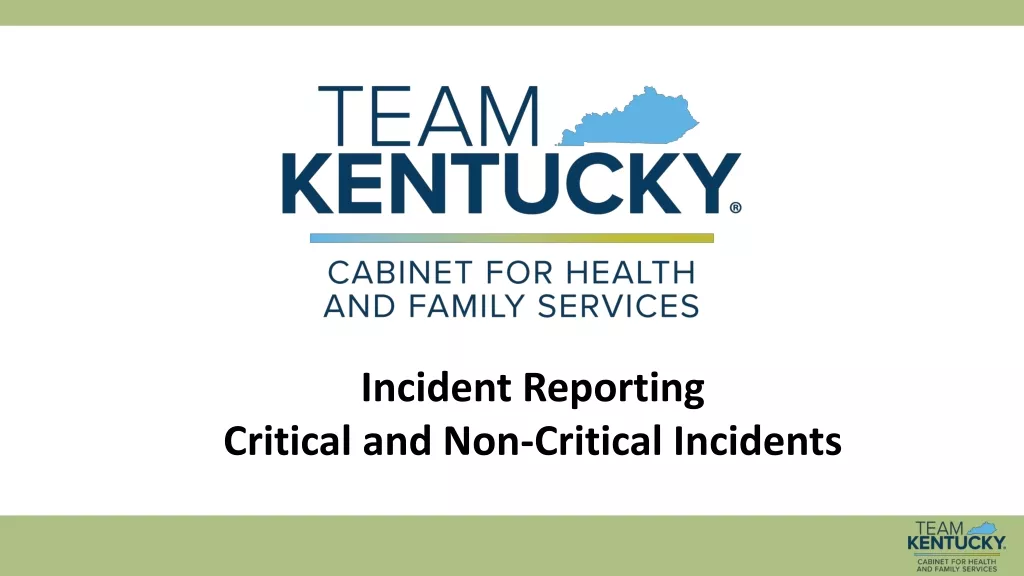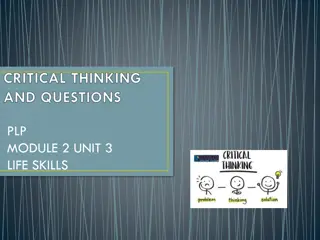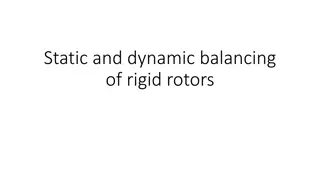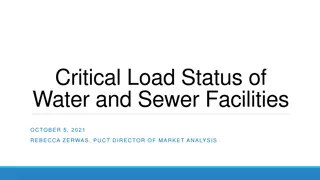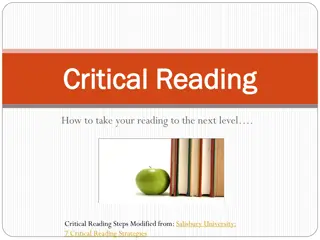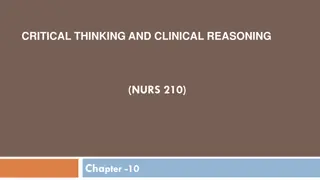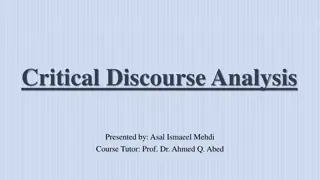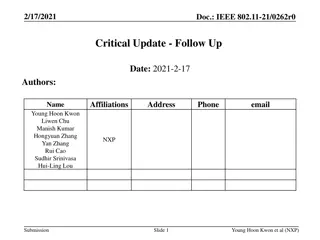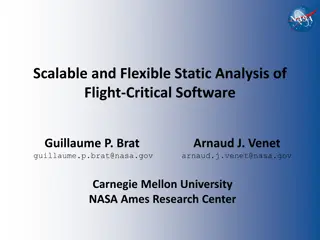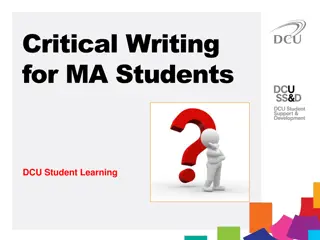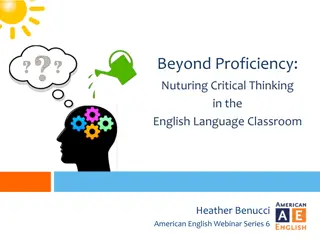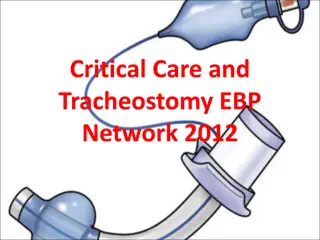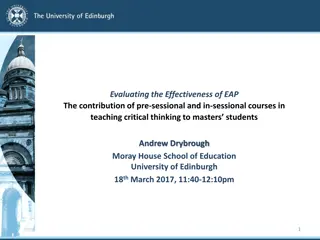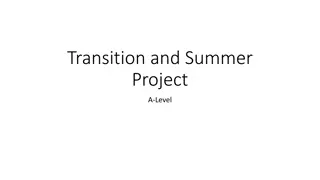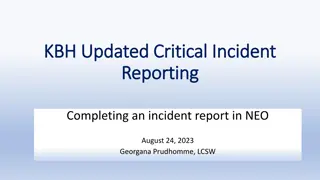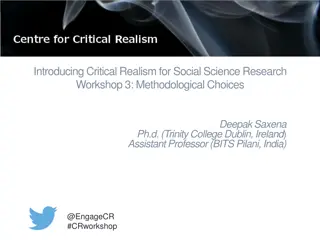How to do Critical Analysis
Massey University provides valuable insights on critical analysis, distinguishing between description and analysis, evaluating evidence and reasons, and making strong arguments. Critical thinking involves evaluating evidence to reach informed conclusions, surpassing mere understanding. While descriptions are necessary, critical depth is vital for academic success.
Download Presentation

Please find below an Image/Link to download the presentation.
The content on the website is provided AS IS for your information and personal use only. It may not be sold, licensed, or shared on other websites without obtaining consent from the author. Download presentation by click this link. If you encounter any issues during the download, it is possible that the publisher has removed the file from their server.
E N D
Presentation Transcript
How to do Critical Analysis Massey University | massey.ac.nz | 0800 MASSEY
By the end of this session, you will be able to understand: The difference between description and analysis How to evaluate the evidence supporting an argument How to evaluate the reasons supporting an argument How to take a position/make an argument 2 Massey University | massey.ac.nz | 0800 MASSEY
What is critical thinking? You probably have some idea of what is meant by critical analysis Try and define critical thinking in one sentence (type your answer in the chat box) Massey University | massey.ac.nz | 0800 MASSEY
What critical thinking is Critical thinking goes beyond just understanding and describing. It involves evaluating quality evidence in the field to come to an informed conclusion and considering the implications of relevant research for understanding the topic. If Description is the What Critical analysis is the Why, How, Because, So What etc Massey University | massey.ac.nz | 0800 MASSEY
What is description? Assignments often require some description. For example: Definitions of theories, concepts, or methods Description of background information (e.g., introductory contextual overview) Description of study or test results (what was found) Reflection on clinical or educational placement (what you did) Summaries of film, television, or novel plots What is described and how you will describe it will vary for different topics. Descriptions, however, are generally brief with the bulk of marks awarded for critical depth. Massey University | massey.ac.nz | 0800 MASSEY
Example: Description of results Stenlund et al. s (2009) randomised controlled trial examined the effects of a cognitively orientated behavioural rehabilitation program and qigong practice (program A) versus qigong practice alone (program B), on psychological variables and sick leave rates in patients with burnout related to workplace stress. Results showed significantly reduced stress behaviour, less fatigue and reduced depression, anxiety and obsessive-compulsive symptoms. Effect size was greater in group A than B. A significant reduction in sick leave rates was found for both groups. Massey University | massey.ac.nz | 0800 MASSEY
Why isnt description enough? It just repeats what is in lectures/readings Without critical analysis it can be unclear if the topic has been fully understood It doesn t show evidence of personal synthesis It doesn t provide an appraisal/evaluation It doesn t show any originality It doesn t indicate what conclusion should be reached Massey University | massey.ac.nz | 0800 MASSEY
The difference between description and analysis. Make the shift Descriptive writing: Critical analytical writing: makes reasoned judgements examines assumptions, premises, and conclusions argues a case according to the evidence draws conclusions evaluates evidence evaluates theories weighs up information indicates why something will work (best) evaluates strengths and weaknesses identifies the significance states what happened gives information lists details explains how something works states what something is like states the order in which things happened says how to do something explains what a theory says notes the method used says when something occurred Adapted from: (Cottrell, 2008) Massey University | massey.ac.nz | 0800 MASSEY
Evaluating Arguments Before you can evaluate an argument you need to understand what is being argued. Try asking yourself questions like: What are they saying? Why are they saying it? What are the implications of their argument? Once you understand it you will be in much better position to evaluate it. To evaluate an argument, try asking yourself questions like: Is the source of adequate quality? (Source type: peer-reviewed academic or suitable grey literature; Recency etc) Is there high quality evidence? Are the evidence and examples given truly representative of the whole area? How does the author s position compare to others researching the topic? Is the methodology sound? Does their argument have limitations? Massey University | massey.ac.nz | 0800 MASSEY
Critical Note-Taking Critical thinking starts with considered reading and analytical note-taking. Do NOT merely copy and paste large amounts of text from the readings. Instead, practice an active note-taking strategy that allows you to: a) extract the key argument/s b) evaluate the contributions of the literature and how it compares to other research on the topic c) consider the implications of the evidence for your own position (and engage with the relevant aspects of the assignment brief) Massey University | massey.ac.nz | 0800 MASSEY
Note-taking Method Example 1: Annotated bibliographies Lee, L., Hsieh, C., & Lin, Y. (2021). Life satisfaction and emotional distress in people living with type 2 diabetes mellitus: The mediating effect of cognitive function. Journal of Clinical Nursing, 30(17-18), 2673-2682. https://doi.org/10.1111/jocn.15740 Summary of study design Argues that Advocates for Rejects/challenges Links to (Relationship to other sources: Consensus? Divergence? Developments?) Implications for practice are Useful for my assignment because Massey University | massey.ac.nz | 0800 MASSEY
Note-taking method 2: Compare and contrast charts Some note-taking methods are particularly well-suited to certain types of assignment questions. Variations on the chart below may be helpful in preparing to answer a compare and contrast question. Observational studies Experimental studies Definition Purpose Variables Types Benefits Limitations Massey University | massey.ac.nz | 0800 MASSEY
Note Evaluation When reviewing your notes, look for themes and patterns in the research conversation Cluster these themes into groups, in preparation for constructing paragraphs Consider how would you answer the assignment question in a single sentence, based on the evidence you have collected? What is your informed perspective on this topic? Massey University | massey.ac.nz | 0800 MASSEY
In what ways does the below demonstrate critical reasoning? The underpinnings of participatory design are far from new to Aotearoa-based indigenous M ori and Pasifika communities. For instance, the principle of whanaungatanga, which relates to collectivism within a well- established kinship system, is deeply ingrained in M oritanga (Durie, 1997, as cited in Brougham & Haar, 2012; Te Morenga et al., 2019; Wakefield, 2019). In a S moan context, the fa amatai system approaches decision- making similarly. Therefore, one could argue that co-design, which is based on developing solutions with, instead of for the communities in question (Sanders, 2008), has the potential to align with kaupapa M ori and work in parallel with indigenous M ori methodologies (Wakefield, 2019). The same can be said with regards to Pacific methodologies. Ideally, however, research is undertaken by someone from within the respective community as both historically and in the present, research has been conducted by outsiders (Smith, 2013). This has led to misappropriations and objectification, severely damaging trust in research by the researched communities (Smith, 2013; Wakefield, 2019). Klinge, C. (2021). Conversations with wool: A place-based approach to reimagining materials innovation in Aotearoa through talanoa and science and design in partnership. [Unpublished Masters dissertation]. Massey University. Massey University | massey.ac.nz | 0800 MASSEY
In what ways does the below demonstrate critical reasoning? The underpinnings of participatory design are far from new to Aotearoa- based indigenous M ori and Pasifika communities. For instance, the principle of whanaungatanga, which relates to collectivism within a well- established kinship system, is deeply ingrained in M oritanga (Durie, 1997, as cited in Brougham & Haar, 2012; Te Morenga et al., 2019; Wakefield, 2019). In a S moan context, the fa amatai system approaches decision-making similarly. Therefore, one could argue that co-design, which is based on developing solutions with, instead of for the communities in question (Sanders, 2008), has the potential to align with kaupapa M ori and work in parallel with indigenous M ori methodologies (Wakefield, 2019). The same can be said with regards to Pacific methodologies. Ideally, however, research is undertaken by someone from within the respective community as both historically and in the present, research has been conducted by outsiders (Smith, 2013). This has led to misappropriations and objectification, severely damaging trust in research by the researched communities (Smith, 2013; Wakefield, 2019). Employs evidence in support of an argument and demonstrates consensus in the literature Articulates an evidence-based hypothesis Considers limitations of the proposal and means to address those limitations Massey University | massey.ac.nz | 0800 MASSEY
In what ways does the below demonstrate critical reasoning? Hiding signs of weakness and presenting a stoic image may have contributed to the assumption that men cope well in disaster events, reflecting the lack of attention in research on men s mental and physical health following disaster. What has been written, although limited, has identified a delay in men presenting with health issues. Deferred access to treatment was seen following the 1990 North Wales floods (Fordham, 2012), the 1972 Wyoming Valley floods (Melick, 1978), the 2010 2011 Canterbury earthquakes (Johnston et al., 2014) and may have contributed to an increase in suicides in men following the 2011 Japanese earthquake and tsunami (Ouri et al., 2015). Men s health in disasters is poorly documented, often unseen and given low priority in disaster contexts, reinforced by a strong assumption that men s health is not adversely affected (Fordham, 2012), thereby reflecting the masculine body politic. Disaster policy also has not addressed these issues Rushton, A. (2020). But what about the men? Storying rural men s experiences and perspectives of the 2016 Kaikoura/Waiau earthquake [Doctoral dissertation, Massey University]. Massey Research Online. http://hdl.handle.net/10179/16546 Massey University | massey.ac.nz | 0800 MASSEY
In what ways does the below demonstrate critical reasoning? Hiding signs of weakness and presenting a stoic image may have contributed to the assumption that men cope well in disaster events, reflecting the lack of attention in research on men s mental and physical health following disaster. What has been written, although limited, has identified a delay in men presenting with health issues. Deferred access to treatment was seen following the 1990 North Wales floods (Fordham, 2012), the 1972 Wyoming Valley floods (Melick, 1978), the 2010 2011 Canterbury earthquakes (Johnston et al., 2014) and may have contributed to an increase in suicides in men following the 2011 Japanese earthquake and tsunami (Ouri et al., 2015). Men s health in disasters is poorly documented, often unseen and given low priority in disaster contexts, reinforced by a strong assumption that men s health is not adversely affected (Fordham, 2012), thereby reflecting the masculine body politic. Disaster policy also has not addressed these issues Demonstrates knowledge of research area (lack of attention, but what s there supports need for thesis) Uses clarifying examples to support research evidence, including recent and local examples Demonstrates a link between ideals of masculinity, poor health outcomes, and disaster policy Massey University | massey.ac.nz | 0800 MASSEY
Taking a position Critical reasoning need not be wholly negative: Think of it as critique rather than critic. Critical reasoning is about being constructive: building a positive position/argument. When constructing your argument ask yourself: What are your reasons for giving the answer you are giving? What makes them good reasons (do you have high quality evidence and clear examples)? Do you have clear points that work to support your response (e.g. your thesis or objective) that you can build paragraphs around? Is there any counter evidence/argument against your argument? How can you respond to the criticisms of your argument (such that your argument still succeeds)? Massey University | massey.ac.nz | 0800 MASSEY
When you take a position and make a statement in response to a question, you might Pick a side (e.g. an agree or disagree; a yes or a no; an A needs more of B, because of C, D & E ) Or select the middle ground ( it depends; F must consider both the strengths and limitations of G, in order to assess H). Whichever position you take, state the why (the because, by, main key ways etc) Massey University | massey.ac.nz | 0800 MASSEY
Which of the below is the better thesis statement? Question: Discuss the nature and influence of Howard Gardner s theory of multiple intelligences. Review and evaluate some of the key criticisms of his approach. A) I will argue that Gardner s theory of multiple intelligences is extremely important due to X B) Gardner s theory of multiple intelligences provides an important framework for future analyses of W and X, but fails to explore factors relating to Y and Z Answer: B The first statement is too vague and doesn t engage with all aspects of the question. Massey University | massey.ac.nz | 0800 MASSEY
Summary In this session you have learned how to: Distinguish between description and analysis Evaluate the evidence supporting an argument Evaluate the reasons supporting an argument Take a position/make an argument Massey University | massey.ac.nz | 0800 MASSEY
Need help? We have a range of free services to help you with your assignment writing and study skills Individual Support: Want to discuss your assignment before you hand it in? Want to discuss study skills (e.g. how to manage time)? Book an appointment at https://massey-nz.libcal.com/ Pre-Reading Service: Submit a draft assignment and receive individual written feedback on your assignment s structure, focus, referencing, and use of sources. This service is available to first year internal and all distance students. You can access the forum through the Academic Writing and Learning Support site on your Stream homepage. Workshops: Seminars and workshops are run on campus and online, which can help you with writing and study skills, such as essay writing, referencing, and writing research proposals. See here for programmes and registration details. See http://owll.massey.ac.nz/about-OWLL/workshops.php Academic Q+A forum: Ask our consultants a question about academic writing and/or study skills. The Q & A forum is a place for students to receive help with quick, study-related questions. You can access the forum through the Academic Writing and Learning Support site on your Stream homepage. OWLL: Information about academic writing and study skills, including assignment planning, essays, reports, and referencing. Go to http://owll.massey.ac.nz/index.php Disability Services: A range of services and support for students who have health and disability issues that are impacting their study. Pacific Massey: Whether studying as an internal or distance student, you can also access Learning support from the Pasifika Learning Advisors. Te Rau Tauawhi: Ko t Te Rau Tauawhi he whina i ng tauira M ori ki te tuku aromatawatai ki Te Reo M ori, ki te tautoko hoki i ng huatanga whakarite tuhinga. The Te Rau Tauawhi M ori Student Centre can help you to submit your assignment in Te Reo M ori and provide general assignment structure support. Massey University | massey.ac.nz | 0800 MASSEY











